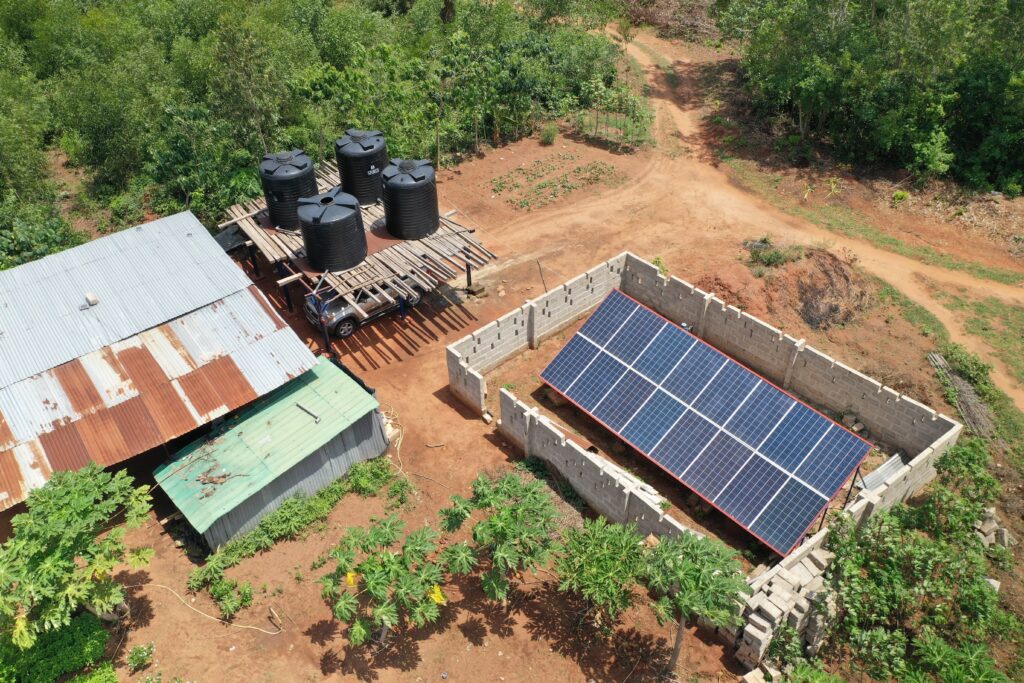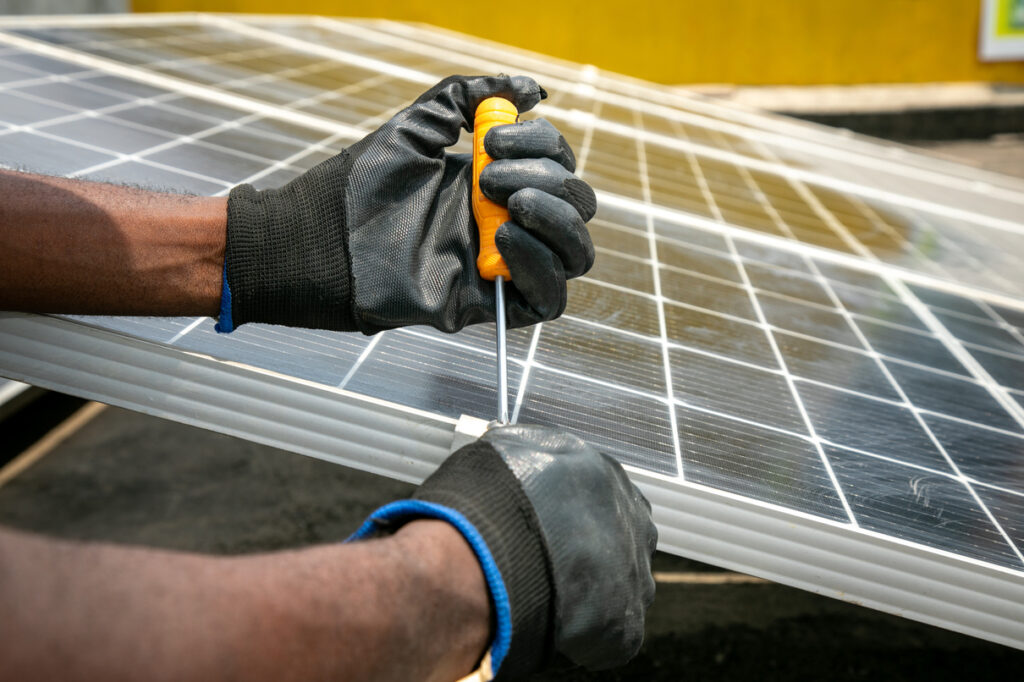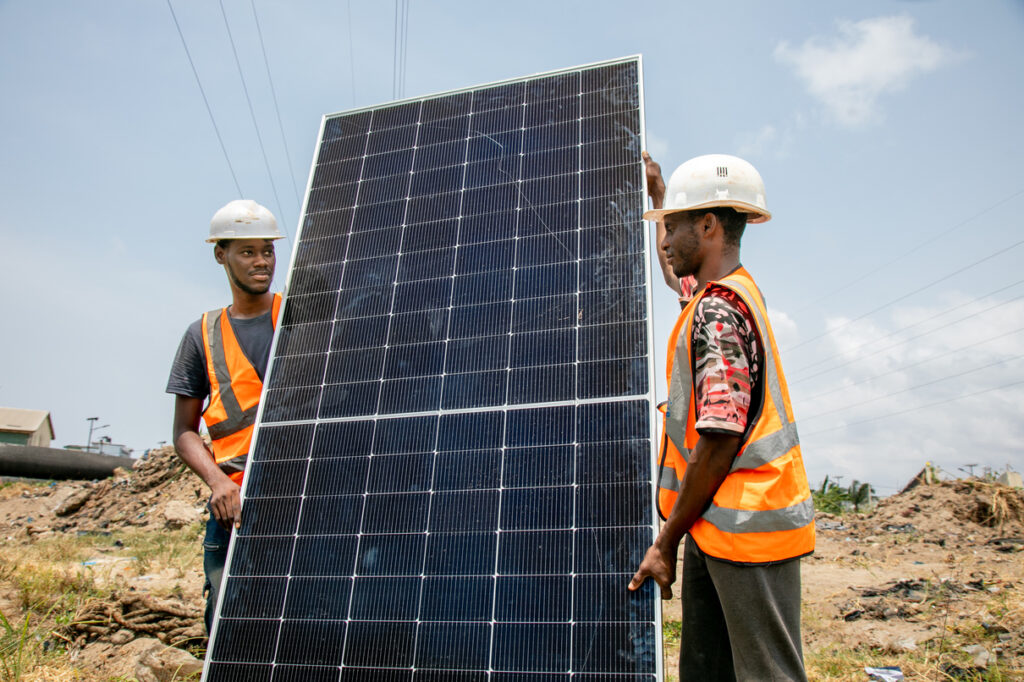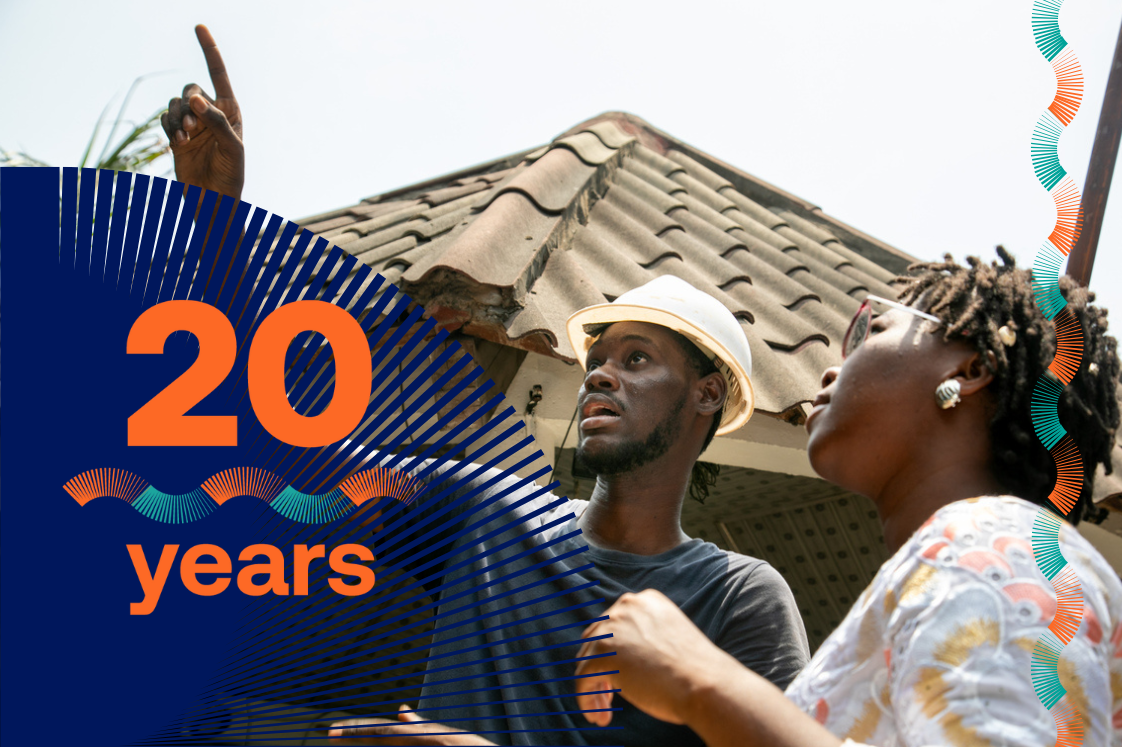Health centres, farms, universities, and other public services across rural Benin need unlimited access to clean water to grow food and serve the community. But with many communities still off-grid, and with climate change bringing increasingly unreliable rainfall to Benin, what financial incentives can be used to encourage private enterprises to support this vital and growing need?
Supporting off-grid resilience
At the Institut universitaire d’enseignement professionnel (IUEP) de Govié, the next generation of farmers are learning their craft. In the flat countryside 40 kilometres north of Cotonou, Benin’s largest city, the university’s agripreneurship students are being led past chicken coops, demonstration plots of cassava and agrifood processing. Although the rains are yet to come, the fields surrounding the school remain lush and green. As the students round a corner, they are shown why: IUEP is home to a solar pump, installed in 2020 with EnDev’s support.
Financial support from EnDev has helped kick-start Benin’s nascent solar pumping industry. Over 5 years, this project supported 21 energy providers, which have in turn sold over 270 solar pumps.
These solar pumps have had an immediate benefit, especially for farmers, reducing their reliance on increasingly erratic rainfall and boosting farm productivity and resilience. This has improved food and nutrition security for farmers and their families, and the elimination of fuel costs for diesel pumps has contributed to larger and more secure incomes. Solar pumping is also allowing farms and agricultural collectives to diversify their produce and businesses. In the southern Beninese town of Zinvié, eight women’s cooperatives are using solar pumps to grow vegetables and cereals during the dry season – something that would not have been possible without a solar pump.

270
solar pumps sold.
Results-based financing (RBF)
Under a RBF agreement, a funder like EnDev releases funds to a partner when certain agreed-upon results are reached and independently verified. This may, for example, be a specified number of people gaining access to a technology. The partner doing the work decides how best to get the results and unlock the funding. EnDev has successfully used RBFs in many countries since 2013.
The positive impacts of solar pumping also extend far beyond the farm. This can most clearly be seen in the 250 Beninese social institutions that have benefited from EnDev’s financial support. Health centres such as Azonaï Health Centre in the southern town of Tori Bossito now have access to unlimited clean water for their maternity services. And the use of solar pumps at agricultural schools such as IUEP – where solar pumping is now part of the agripreneurship curriculum – is providing youth first-hand lessons in the benefits of solar pumping and the importance of resilient, sustainable farming. Some municipalities have also installed village water supply systems thanks to the project.
Flexible and dependable financing
In 2014, when EnDev began to promote solar pumps in Benin, the government lacked the resources to promote solar energy among farming communities, and the country’s renewable energy sector, which consisted of fewer than 10 companies, had yet to expand into the rural north. After talking to some of these businesses, EnDev learnt that limited access to finance prevented companies from importing quality equipment in the quantities needed to expand.
To overcome the challenge, EnDev decided to use results-based financing (RBF) to support solar pump companies. Today, RBF – which makes financing dependent on the number of installed solar pumps eligible under the scheme – . This is because it incentivises private-sector partners to engage in underdeveloped markets by providing them with a market premium for each unit sold to target customers. But in 2014, RBF was a new approach, both for EnDev and for the companies in Benin. To encourage companies to work with the scheme, the government supported the project by granting exemptions from value added tax and customs duties for participating businesses.


The implementation of RBF was market-oriented and focused primarily on promoting supply. The final beneficiaries were required to pay for the equipment, while companies were responsible for delivering and installing equipment that met quality standards. Companies were also expected to address operational issues and provide customer training as part of the after-sales service.
The project provided important lessons that helped EnDev to further develop its RBF approach. One key insight was the importance of carefully designing the scheme to prevent over-subsidisation: for example, companies receiving RBF support for equipment were no longer allowed to receive additional financial assistance for the same items, ensuring a level playing field for all participants. To support companies early in the process, EnDev also provided regular trainings to help them meet eligibility criteria, strengthening their capacity and laying the foundation for effective participation. In parallel, the team improved the verification system, introducing more efficient methods such as sampling while safeguarding robustness of the process.
When we started supporting the private sector, there were fewer than 10 companies in Benin working in the solar sector. But thanks to EnDev’s use of RBF, we are seeing more than 20 new companies being created by local people and even international companies.
- Anick Assiba Kemonou Davo, EnDev Benin Tweet
Close collaboration with national partners proved equally crucial. Working hand in hand with ministries and government agencies, EnDev supported efforts to curb the informal solar market, which often offers cheap but low-quality products that undermine consumer trust and threaten the sector’s long-term sustainability. By sharing project findings with the government, EnDev ensured that valuable lessons would inform future policymaking beyond the lifetime of the project.
Over the course of the initiative, 287 pumps were installed in various sites, including training centres, health centres, village communities, and agro-pastoral units. Since 2019, when the project suspended the RBF mechanism, companies have continued to sell their equipment using innovative payment methods and seek financing to meet market needs.
A shining success
This adaptive approach, coupled with tried-and-tested RBF, has helped kick-start Benin’s solar industry. But convincing people of the benefits of solar pumping, which remains a considerable investment for many in Benin, goes deeper than informing about its technical features and virtues. It requires a change in behaviour and attitudes. This is where social institutions like Azonaï Health Centre and IUEP, the agricultural university, will play a pivotal role. Whether educating a new generation in the importance of solar pumping for food and nutrition security, or providing safe births with the help of clean water supplies, social institutions are demonstrating the enormous value of solar power.
Key take-aways
Design RBF schemes carefully to prevent over-subsidisation and ensure a level playing field for all participants.
Provide early support and capacity-building for companies to meet eligibility criteria, laying the foundation for effective participation.
Collaborate closely with ministries and government agencies, sharing project findings to ensure lessons inform future policymaking.
Work with the government to address the informal solar sector, whose cheap, low-quality products threaten long-term market sustainability.
